1 of 38
THREAD
Most patriots agree that we're fighting something called "globalism."
But what is it?
Globalism was invented in Victorian England, and later pushed by the British Fabians.
It is now the dominant belief system of today's world.
George Orwell called it INGSOC.
THREAD
Most patriots agree that we're fighting something called "globalism."
But what is it?
Globalism was invented in Victorian England, and later pushed by the British Fabians.
It is now the dominant belief system of today's world.
George Orwell called it INGSOC.

2 of 38
In his novel 1984, Orwell foretold a future in which the British Empire and Commonwealth merge with the United States to form Oceania, a superstate driven by an evil ideology called Ingsoc (English Socialism).
Orwell's dystopia was based on actual globalist plans.
In his novel 1984, Orwell foretold a future in which the British Empire and Commonwealth merge with the United States to form Oceania, a superstate driven by an evil ideology called Ingsoc (English Socialism).
Orwell's dystopia was based on actual globalist plans.

3 of 38
As British power expanded in the 19th century, global dominion seemed inevitable.
Imperial administrators laid plans for a world united under British rule.
The key to making it work was to join forces with the United States.
As British power expanded in the 19th century, global dominion seemed inevitable.
Imperial administrators laid plans for a world united under British rule.
The key to making it work was to join forces with the United States.
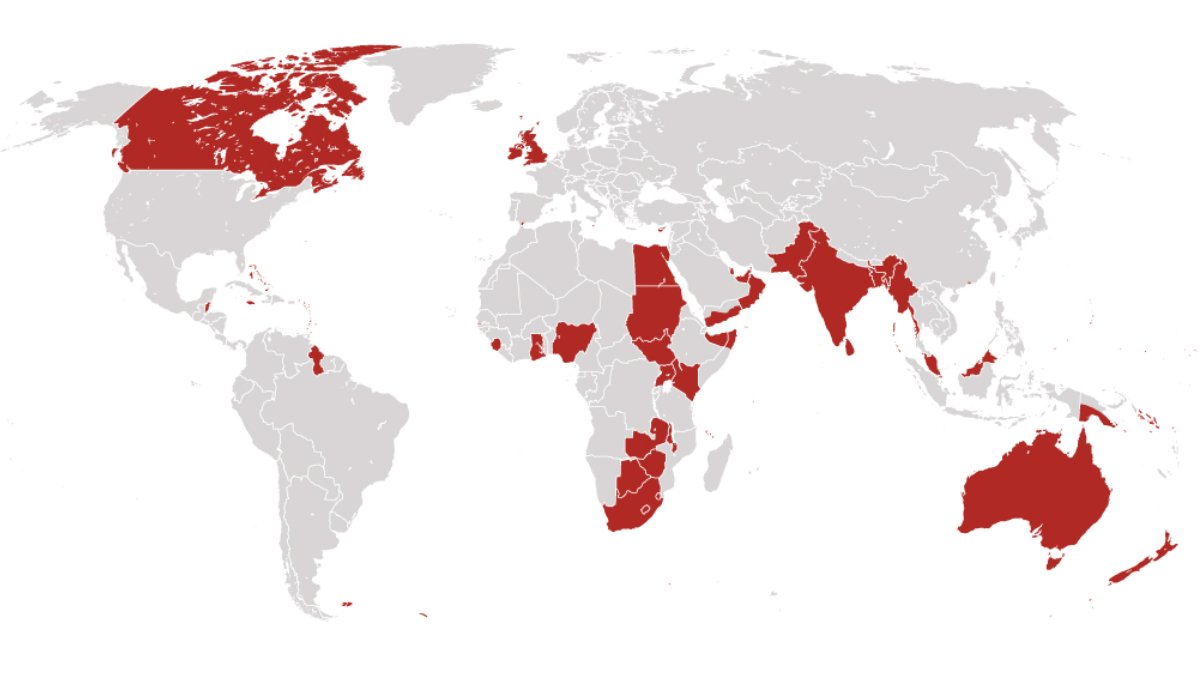
4 of 38
In 1842, Alfred Tennyson — soon to become Queen Victoria's official poet laureate — wrote the poem "Locksley Hall."
It envisioned a golden age of peace, under "universal law," a "Parliament of man" and a "Federation of the world."
poetryfoundation.org/poems/45362/lo…



In 1842, Alfred Tennyson — soon to become Queen Victoria's official poet laureate — wrote the poem "Locksley Hall."
It envisioned a golden age of peace, under "universal law," a "Parliament of man" and a "Federation of the world."
poetryfoundation.org/poems/45362/lo…
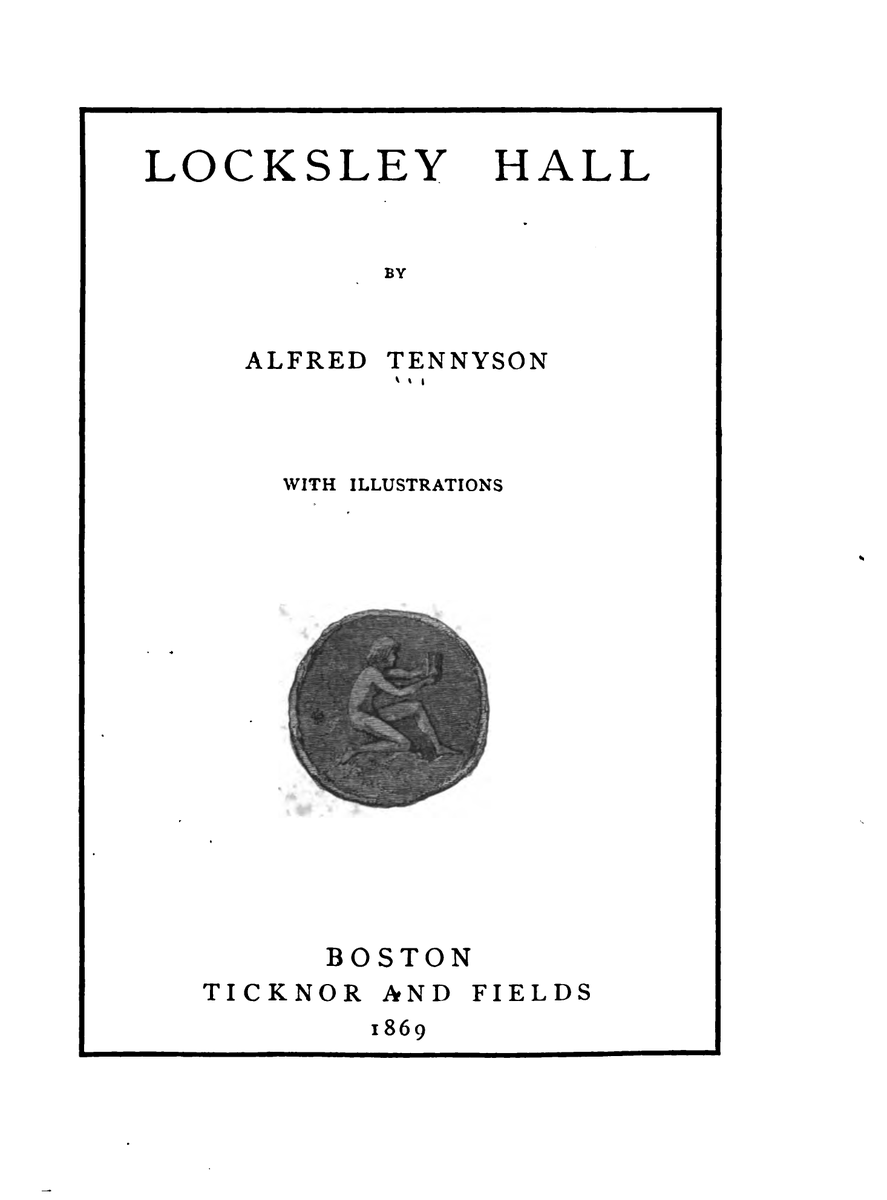

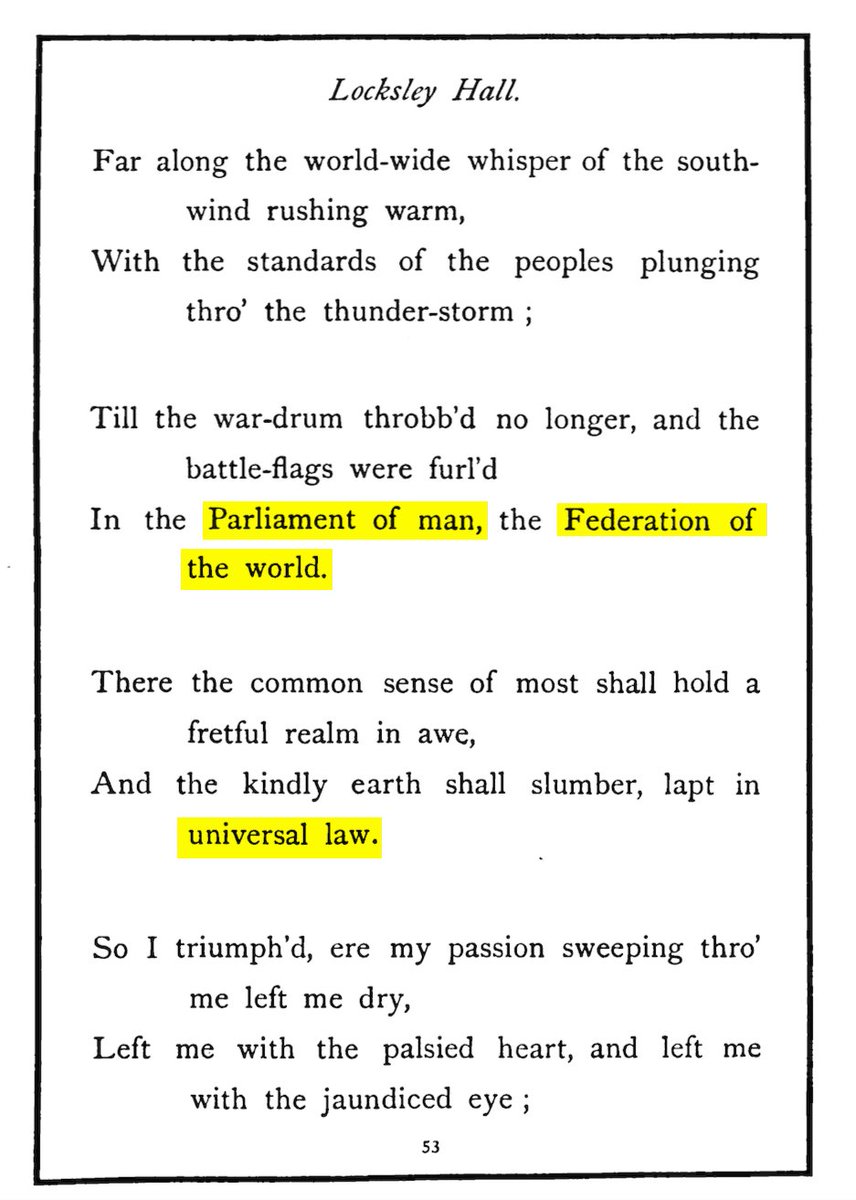
5 of 38
Tennyson's words foreshadowed the League of Nations and the UN.
But Tennyson did not invent these concepts.
He merely celebrated plans already underway among British elites.
Tennyson's words foreshadowed the League of Nations and the UN.
But Tennyson did not invent these concepts.
He merely celebrated plans already underway among British elites.
6 of 38
Generations of British globalists have cherished Tennyson's poem as if it were Holy Writ.
Winston Churchill praised it in 1931 as "the most wonderful of all modern prophecies."
He called the League of Nations a fulfillment of Tennyson's vision.
archive.macleans.ca/article/1931/1…

Generations of British globalists have cherished Tennyson's poem as if it were Holy Writ.
Winston Churchill praised it in 1931 as "the most wonderful of all modern prophecies."
He called the League of Nations a fulfillment of Tennyson's vision.
archive.macleans.ca/article/1931/1…
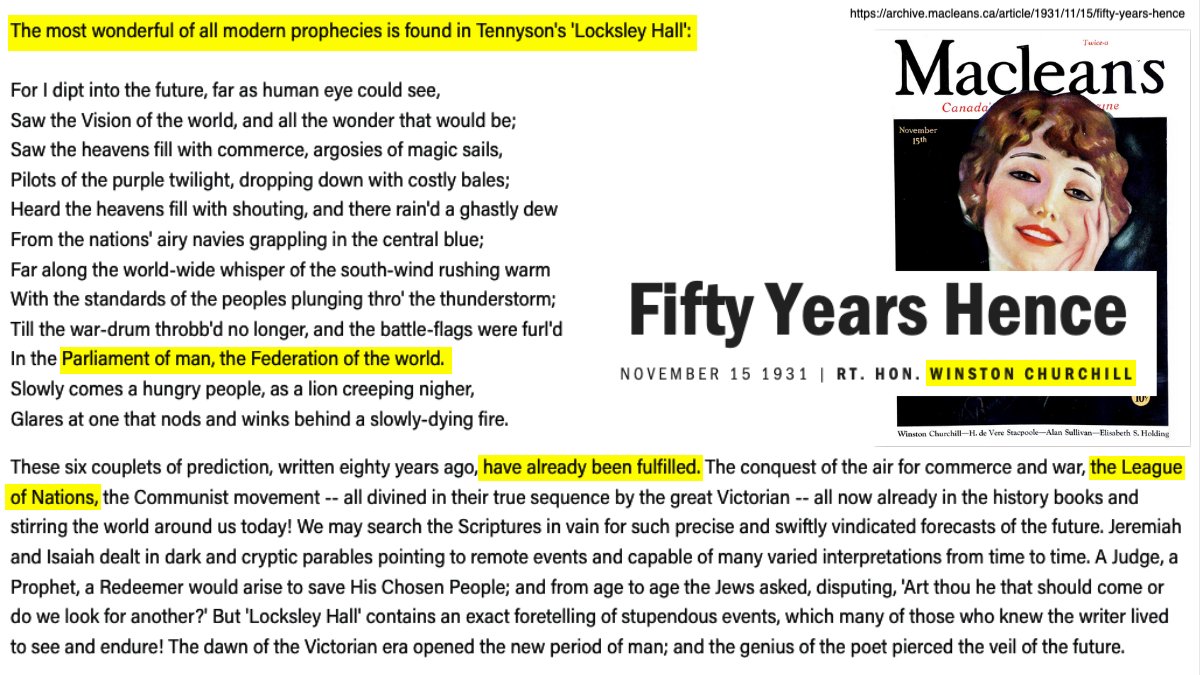
7 of 38
Another British leader influenced by Tennyson's poem was John Ruskin.
In his first lecture at Oxford in 1870, Ruskin electrified students by declaring it was Britain's destiny to "Reign or Die" — to rule the world or be ruled by others.
gutenberg.org/files/19164/19…

Another British leader influenced by Tennyson's poem was John Ruskin.
In his first lecture at Oxford in 1870, Ruskin electrified students by declaring it was Britain's destiny to "Reign or Die" — to rule the world or be ruled by others.
gutenberg.org/files/19164/19…

8 of 38
With these words, Ruskin gave birth to "liberal imperialism."
Ruskin called himself a "Communist," before Marx had finished writing DAS KAPITAL.
In Ruskin's view, the British Empire was the perfect vehicle for spreading socialism.
plough.com/en/topics/just…



With these words, Ruskin gave birth to "liberal imperialism."
Ruskin called himself a "Communist," before Marx had finished writing DAS KAPITAL.
In Ruskin's view, the British Empire was the perfect vehicle for spreading socialism.
plough.com/en/topics/just…
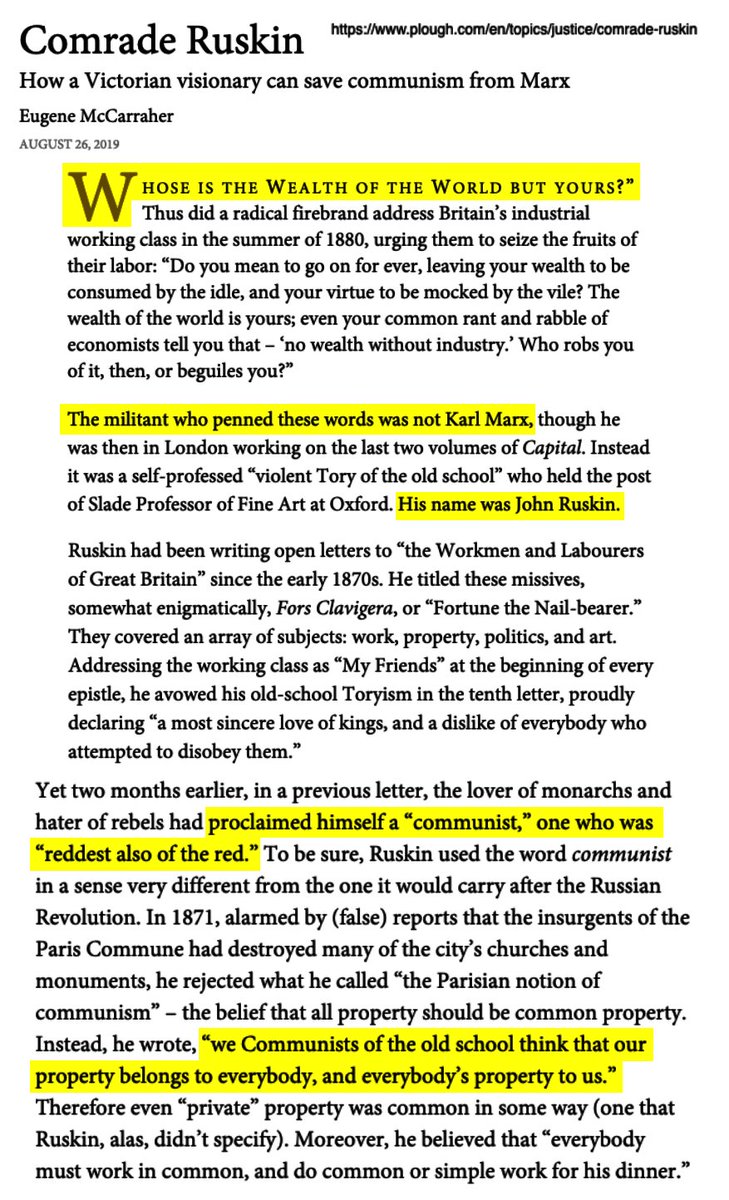
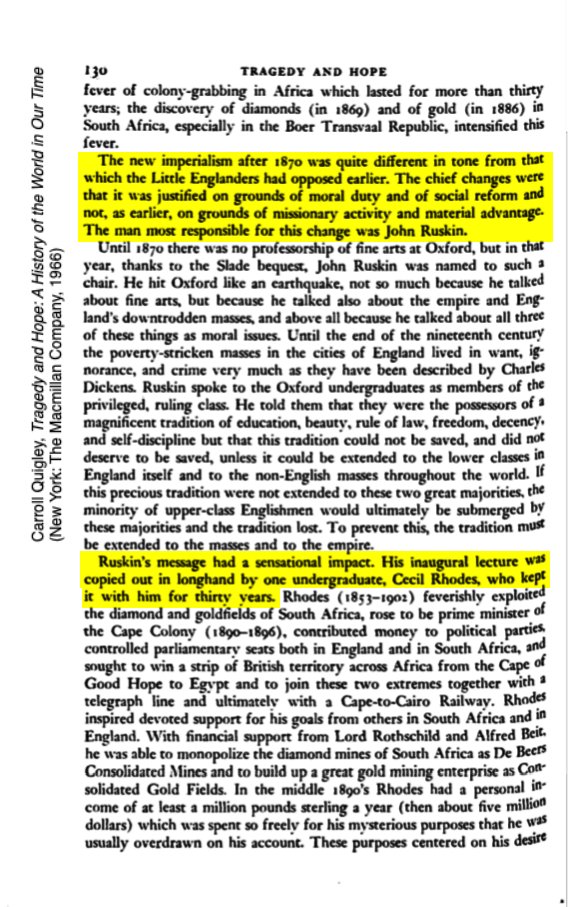
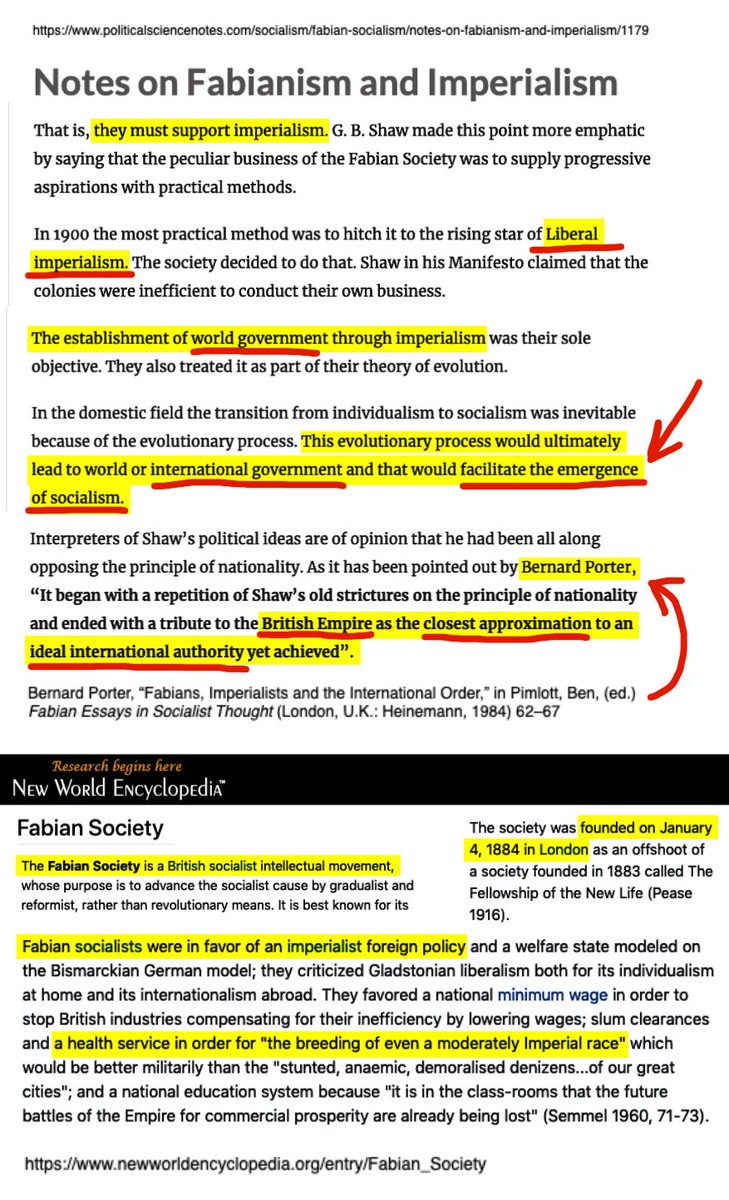
9 of 38
Ruskin's socialism was strangely mixed with elitism.
He extolled the superiority of the "northern" races, by which he meant the Normans, Celts and Anglo-Saxons who built England.
He saw the aristocracy — not the common people — as the embodiment of British virtue.




Ruskin's socialism was strangely mixed with elitism.
He extolled the superiority of the "northern" races, by which he meant the Normans, Celts and Anglo-Saxons who built England.
He saw the aristocracy — not the common people — as the embodiment of British virtue.
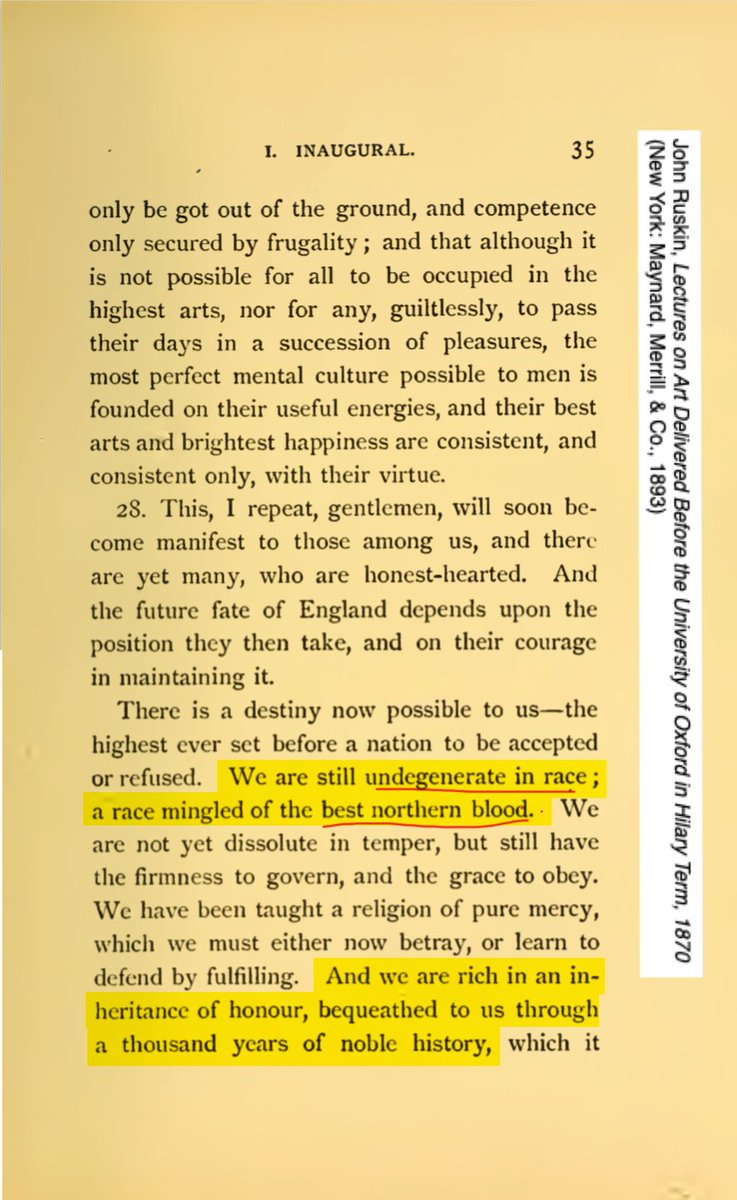

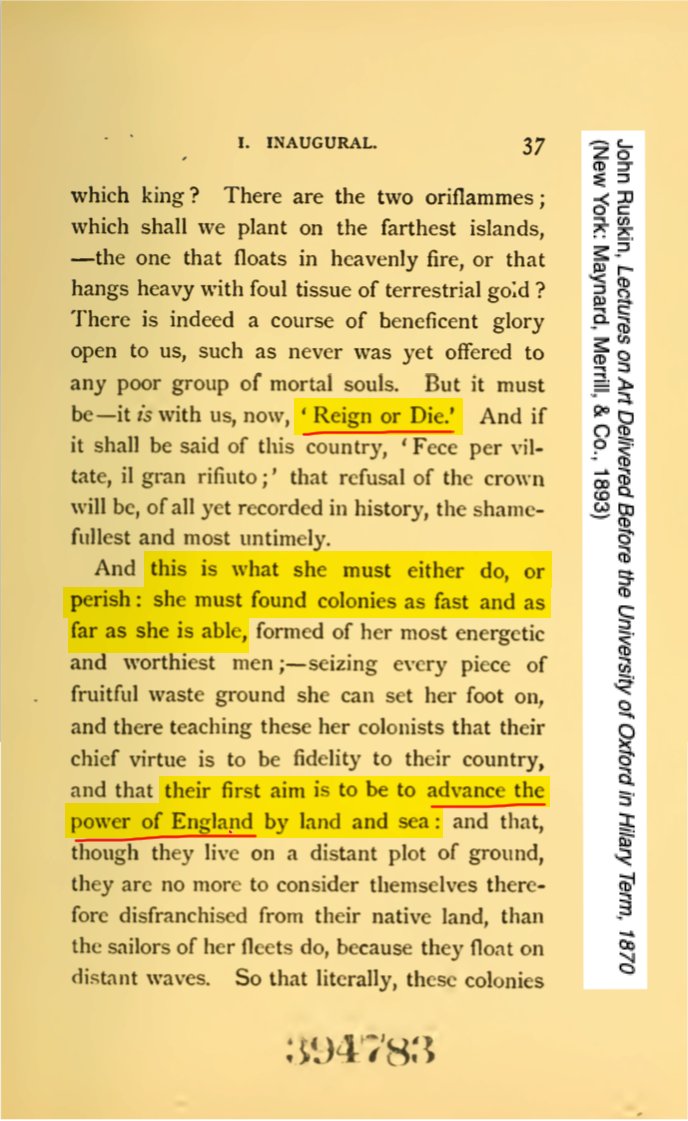

10 of 38
Ruskin was also an occultist and (according to some biographers) a pedophile.
In these respects, his eccentricities resembled those still fashionable in certain globalist circles today.
dailyartmagazine.com/john-ruskin-bo…


Ruskin was also an occultist and (according to some biographers) a pedophile.
In these respects, his eccentricities resembled those still fashionable in certain globalist circles today.
dailyartmagazine.com/john-ruskin-bo…

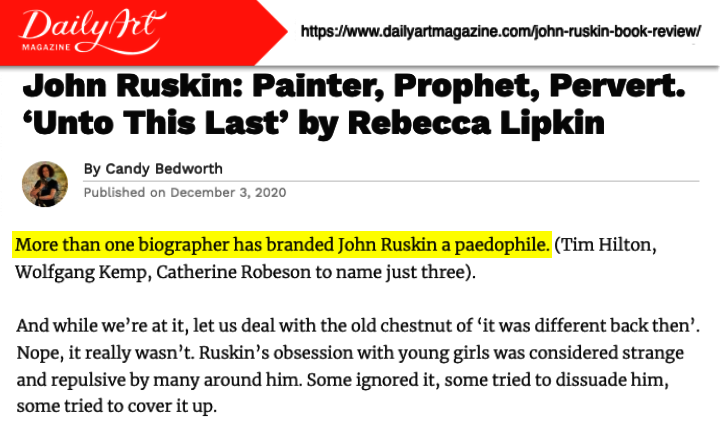
11 of 38
Ruskin's teachings inspired a generation of British statesmen.
One of the most devoted Ruskinites was Cecil Rhodes (1853-1902).
As an undergraduate, Rhodes heard Ruskin's inaugural lecture, and kept a copy of it for the rest of his life.
Ruskin's teachings inspired a generation of British statesmen.
One of the most devoted Ruskinites was Cecil Rhodes (1853-1902).
As an undergraduate, Rhodes heard Ruskin's inaugural lecture, and kept a copy of it for the rest of his life.

12 of 38
As a statesman, Rhodes aggressively promoted British expansion.
"The more of the world we inhabit, the better it is for the human race," he said.
pages.uoregon.edu/kimball/Rhodes…

As a statesman, Rhodes aggressively promoted British expansion.
"The more of the world we inhabit, the better it is for the human race," he said.
pages.uoregon.edu/kimball/Rhodes…

13 of 38
In his will, Rhodes left a fortune to promote "British rule throughout the world"; federation of all English-speaking countries; and "the ultimate recovery of the United States of America as an integral part of the British Empire."
pages.uoregon.edu/kimball/Rhodes…

In his will, Rhodes left a fortune to promote "British rule throughout the world"; federation of all English-speaking countries; and "the ultimate recovery of the United States of America as an integral part of the British Empire."
pages.uoregon.edu/kimball/Rhodes…
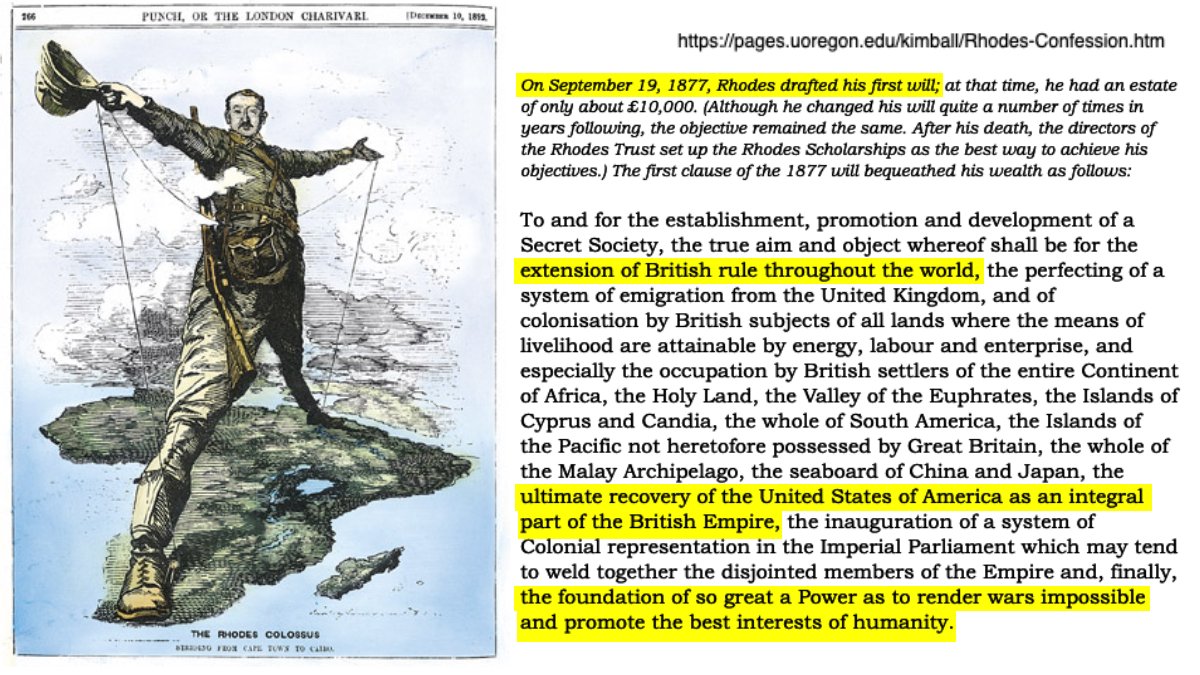
14 of 38
All this was supposed to lead to "the foundation of so great a power as to hereafter render wars impossible and promote the best interests of humanity," Rhodes concluded in his will.
Thus, world peace would be attained through British hegemony.
pages.uoregon.edu/kimball/Rhodes…
All this was supposed to lead to "the foundation of so great a power as to hereafter render wars impossible and promote the best interests of humanity," Rhodes concluded in his will.
Thus, world peace would be attained through British hegemony.
pages.uoregon.edu/kimball/Rhodes…
15 of 38
By the 1890s, most British leaders agreed with Rhodes.
Following his death in 1902, Alfred Milner took over Rhodes's movement, setting up secretive "Round Table" groups to propagandize for a worldwide federation of English-speaking countries.




By the 1890s, most British leaders agreed with Rhodes.
Following his death in 1902, Alfred Milner took over Rhodes's movement, setting up secretive "Round Table" groups to propagandize for a worldwide federation of English-speaking countries.
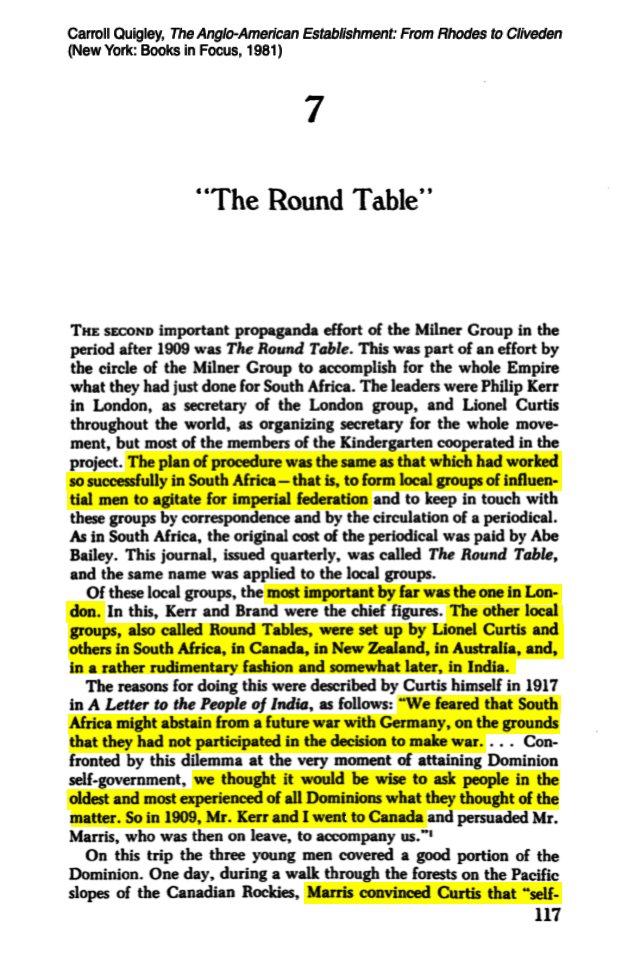
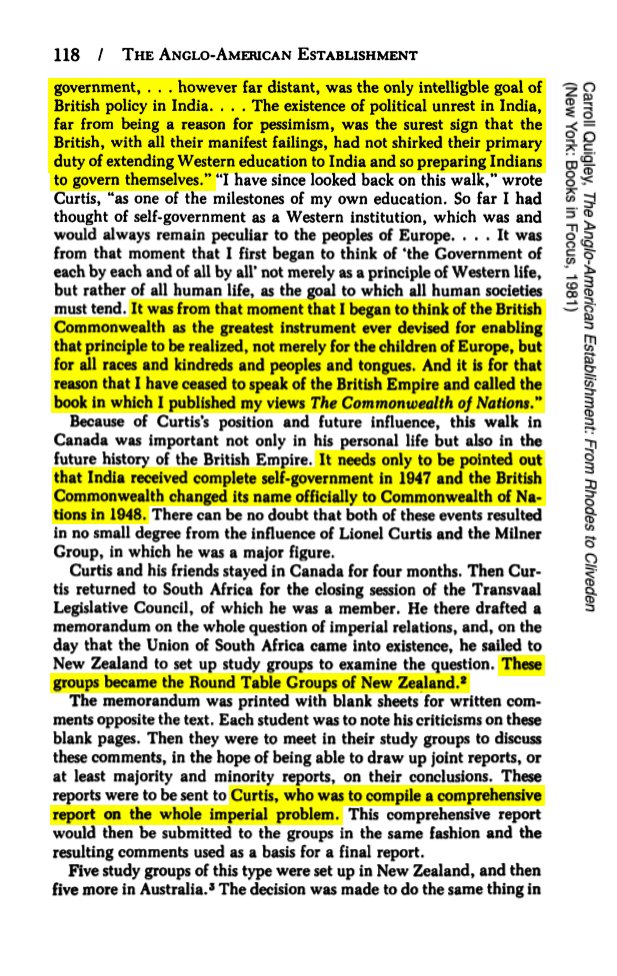
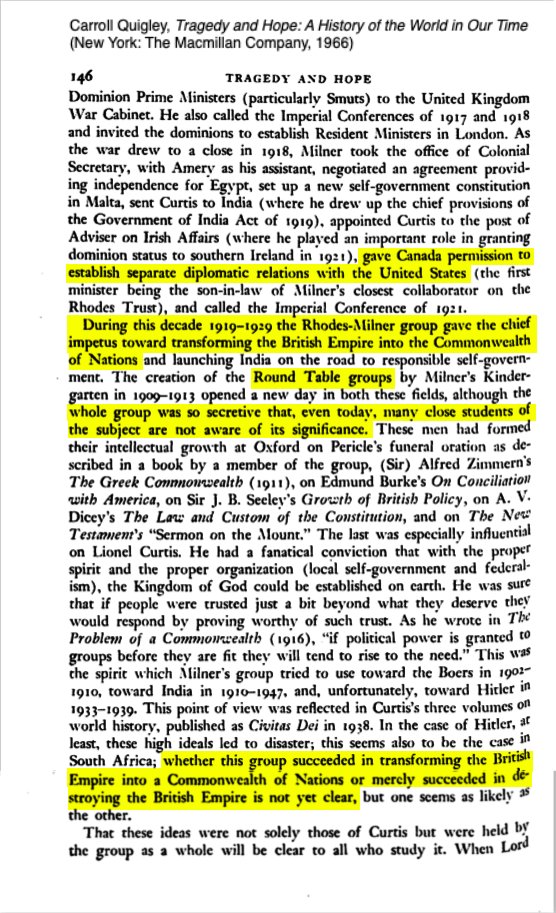
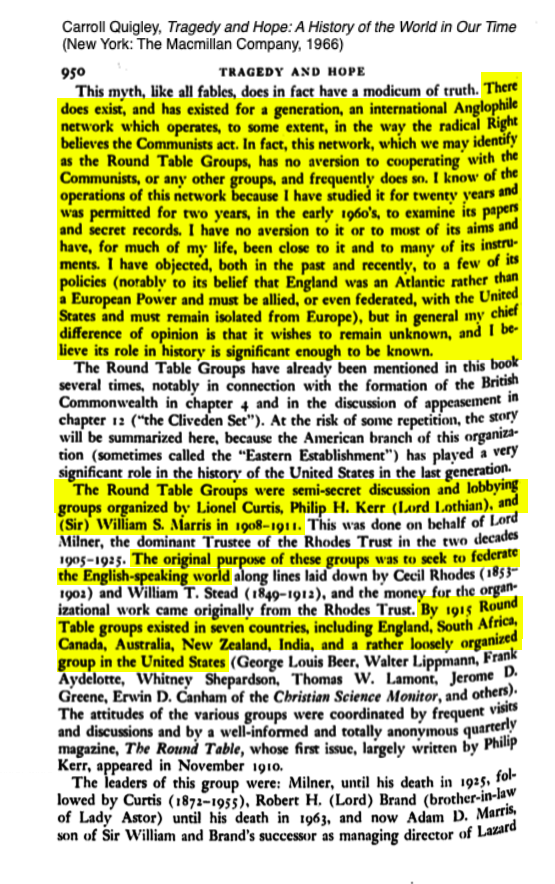
16 of 38
In each target country — including the US — the Round Tablers recruited local leaders to act as "Judas goats."
A Judas goat is an animal trained to lead others to the slaughter.
books.google.com/books?id=PlEEA…

In each target country — including the US — the Round Tablers recruited local leaders to act as "Judas goats."
A Judas goat is an animal trained to lead others to the slaughter.
books.google.com/books?id=PlEEA…
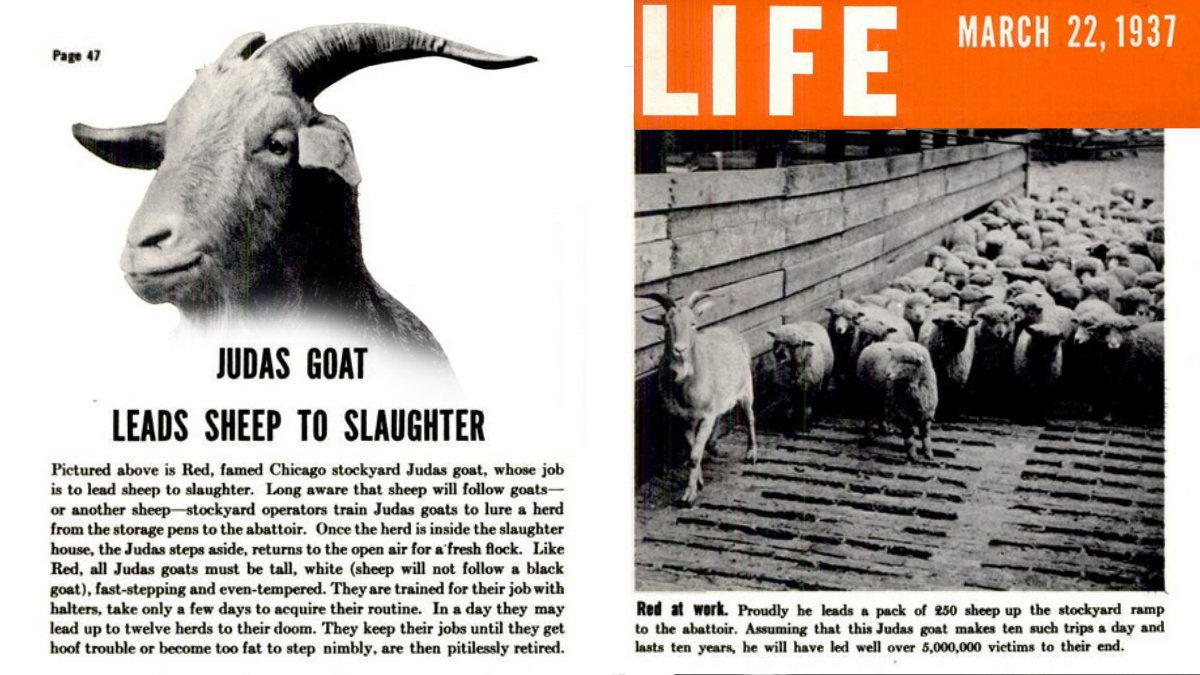
17 of 38
In fact, the Round Table was leading people to a literal slaughter.
War with Germany was expected.
The Round Table sought commitments from each English-speaking colony to send troops when the time came.
Australia, Canada, New Zealand and South Africa agreed.



In fact, the Round Table was leading people to a literal slaughter.
War with Germany was expected.
The Round Table sought commitments from each English-speaking colony to send troops when the time came.
Australia, Canada, New Zealand and South Africa agreed.

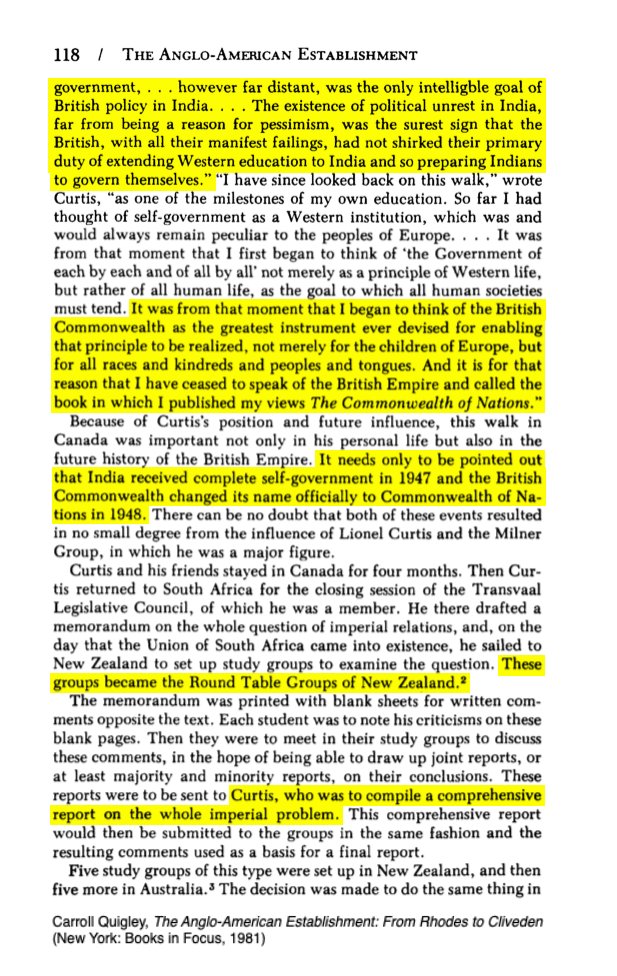
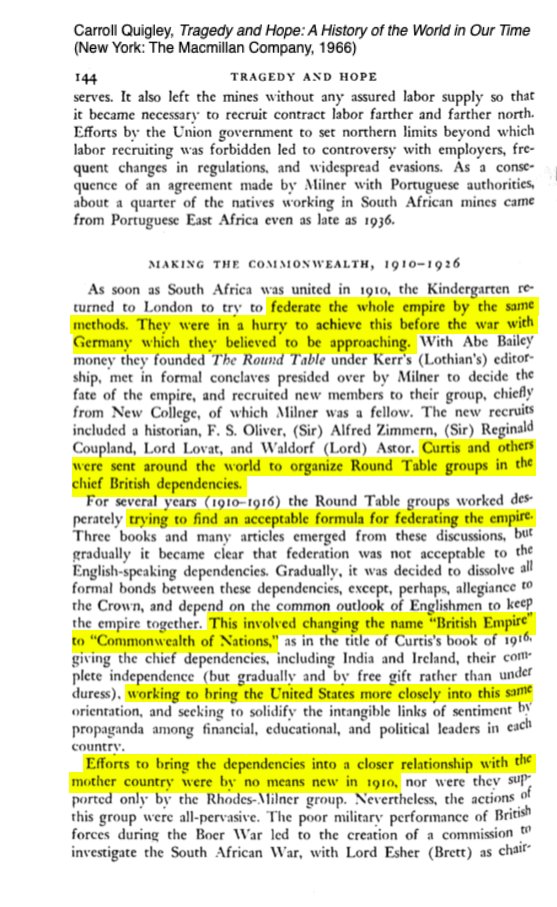
18 of 38
WWI pushed the world toward globalism, giving rise to the League of Nations.
This was by design.
Generations of schoolchildren have learned that Woodrow Wilson was the father of globalism.
But Wilson's "ideals" were spoon-fed to him by British agents.
WWI pushed the world toward globalism, giving rise to the League of Nations.
This was by design.
Generations of schoolchildren have learned that Woodrow Wilson was the father of globalism.
But Wilson's "ideals" were spoon-fed to him by British agents.

19 of 38
On August 14, 1914 — only 10 days after England declared war — novelist H.G. Wells wrote an article headlined, "The War That Will End War."
"[T]his is now a war for peace..." he declared. "It aims at a settlement that shall stop this sort of thing for ever."
On August 14, 1914 — only 10 days after England declared war — novelist H.G. Wells wrote an article headlined, "The War That Will End War."
"[T]his is now a war for peace..." he declared. "It aims at a settlement that shall stop this sort of thing for ever."
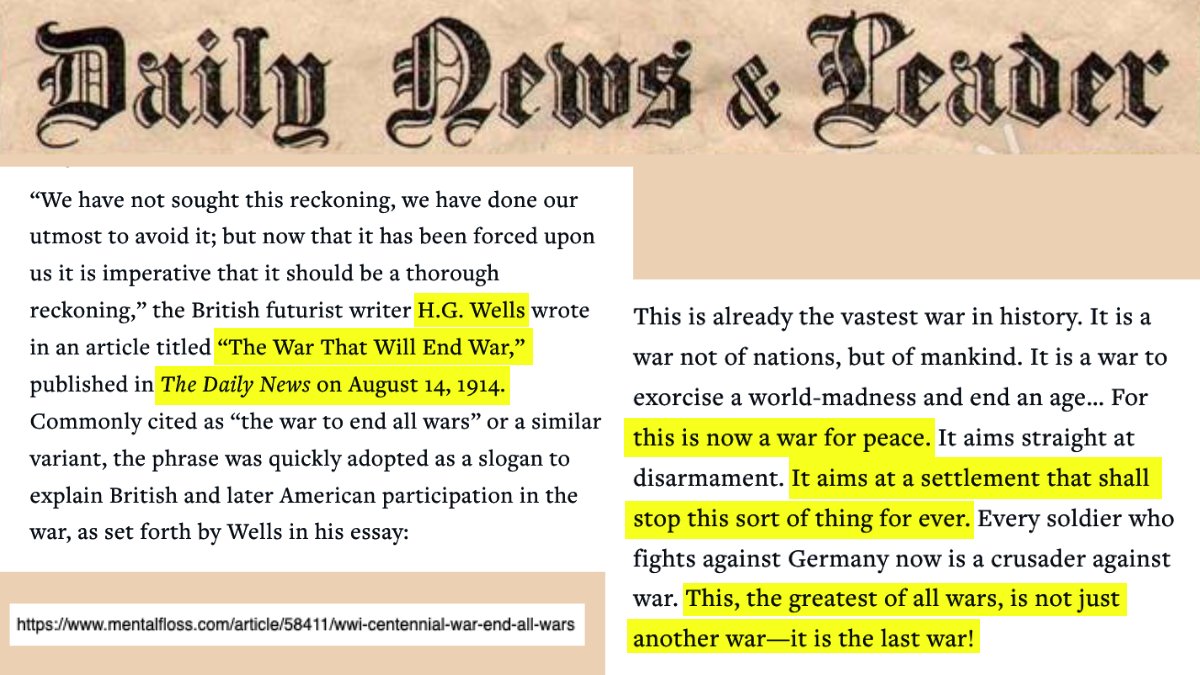
20 of 38
Wells released a book version of "The War That Will End War" in October 1914.
He wrote, "If Liberals throughout the world... will insist upon a World conference at the end of this conflict... they may... set up a Peace League that will control the globe."


Wells released a book version of "The War That Will End War" in October 1914.
He wrote, "If Liberals throughout the world... will insist upon a World conference at the end of this conflict... they may... set up a Peace League that will control the globe."


21 of 38
Wells did not invent the idea of a "Peace League."
He was simply promoting official British policy, in keeping with his mission as a secret operative of Britain's War Propaganda Bureau (known as Wellington House).



Wells did not invent the idea of a "Peace League."
He was simply promoting official British policy, in keeping with his mission as a secret operative of Britain's War Propaganda Bureau (known as Wellington House).



22 of 38
British leaders were committed to a Peace League after the war.
But they understood it would never work without US support.
For that reason, British intelligence made special efforts to penetrate the Wilson White House, a task which proved surprisingly easy.
British leaders were committed to a Peace League after the war.
But they understood it would never work without US support.
For that reason, British intelligence made special efforts to penetrate the Wilson White House, a task which proved surprisingly easy.
23 of 38
Wilson's closest advisor was "Colonel" Edward House, a Texan with strong family ties to England.
During the Civil War, House's British-born father made a fortune as a blockade runner, trading cotton for British munitions, to arm rebel troops.
google.com/books/edition/…




Wilson's closest advisor was "Colonel" Edward House, a Texan with strong family ties to England.
During the Civil War, House's British-born father made a fortune as a blockade runner, trading cotton for British munitions, to arm rebel troops.
google.com/books/edition/…
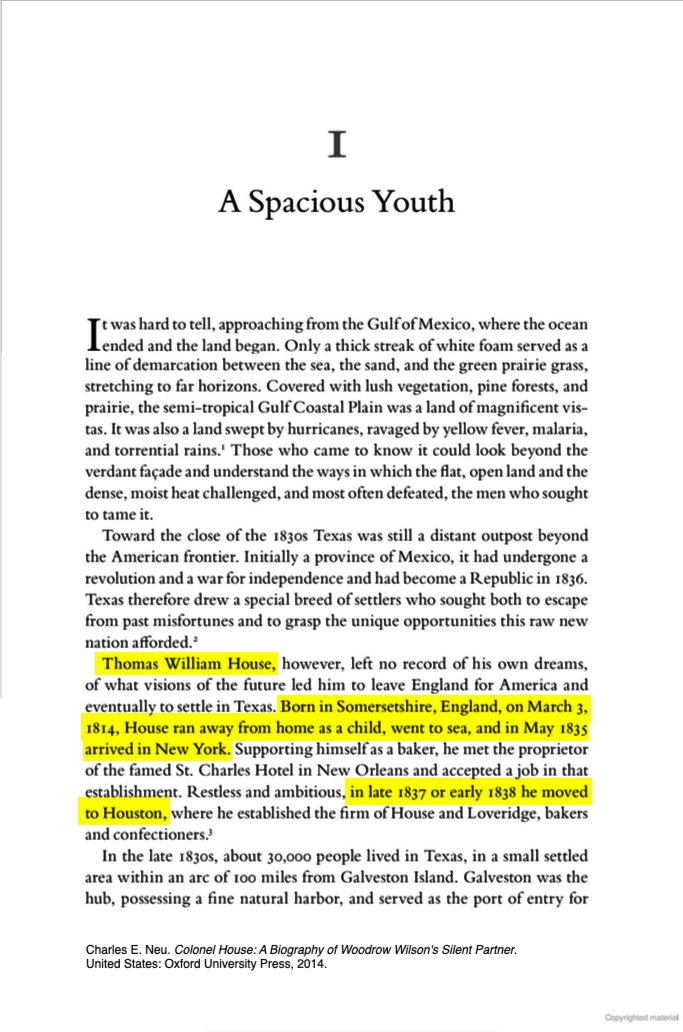
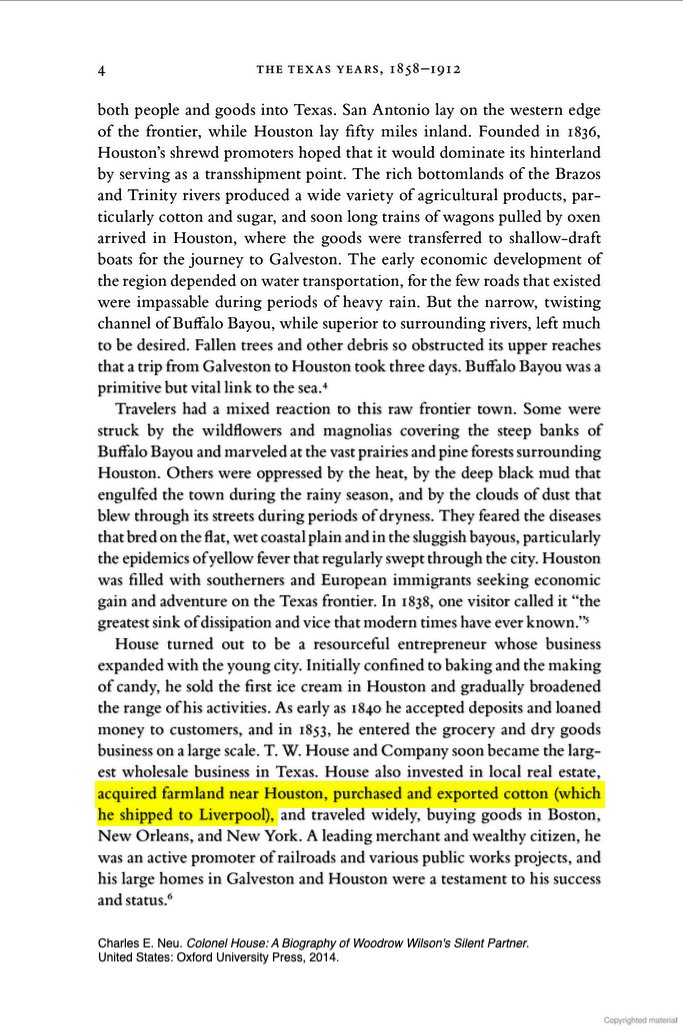


24 of 38
While advising President Wilson, Colonel House worked closely with British spies, especially Sir William Wiseman, the US station chief for Britain's Secret Intelligence Service (SIS).
House, Wiseman, and Wilson became intimate friends, even vacationing together.




While advising President Wilson, Colonel House worked closely with British spies, especially Sir William Wiseman, the US station chief for Britain's Secret Intelligence Service (SIS).
House, Wiseman, and Wilson became intimate friends, even vacationing together.

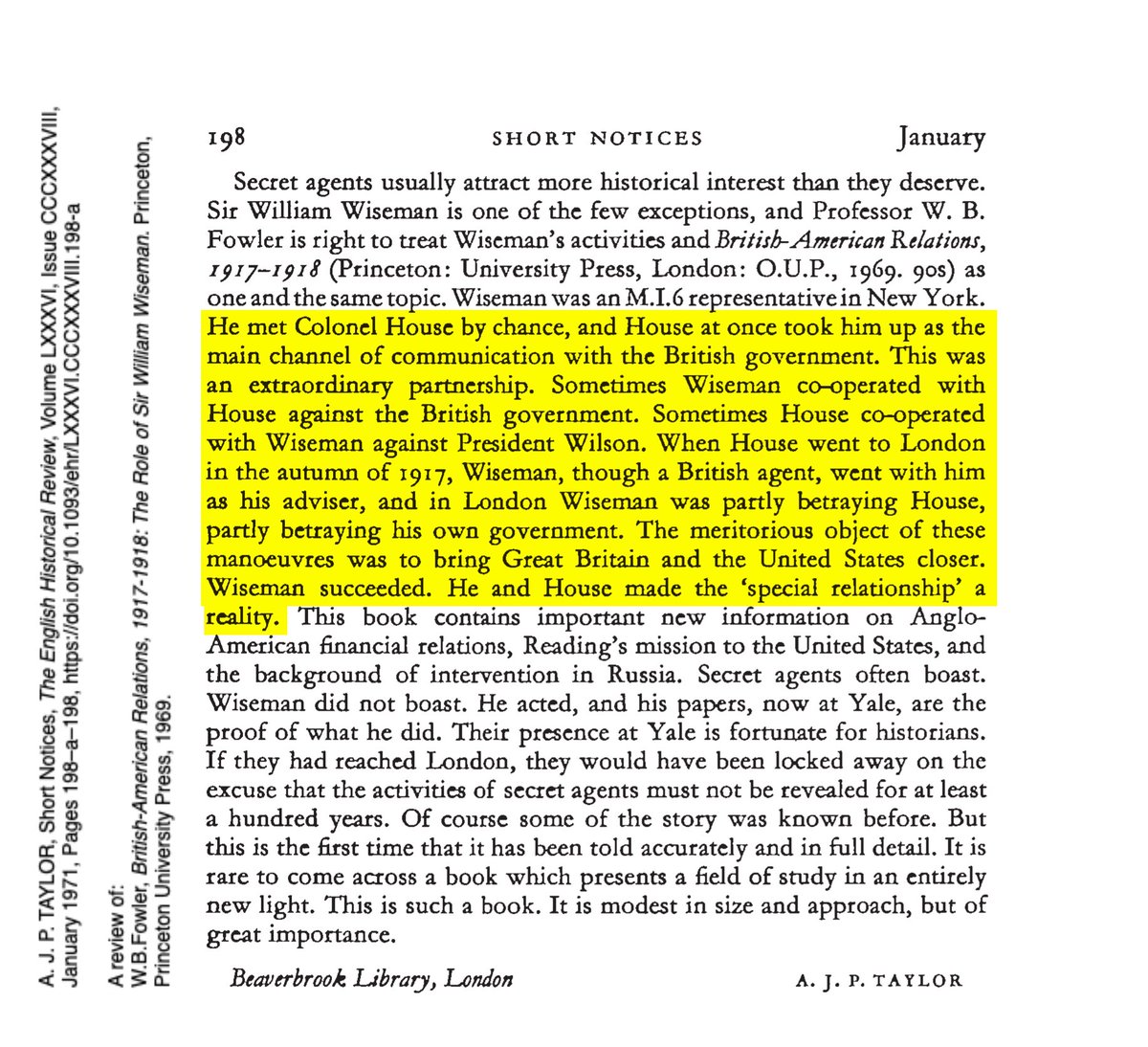
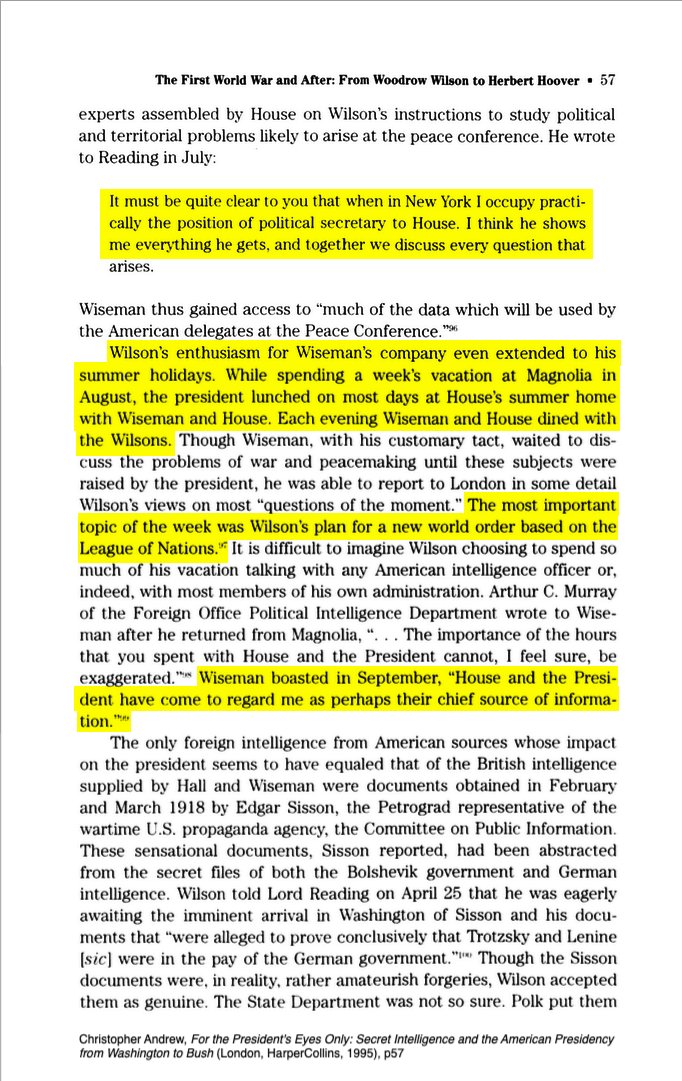
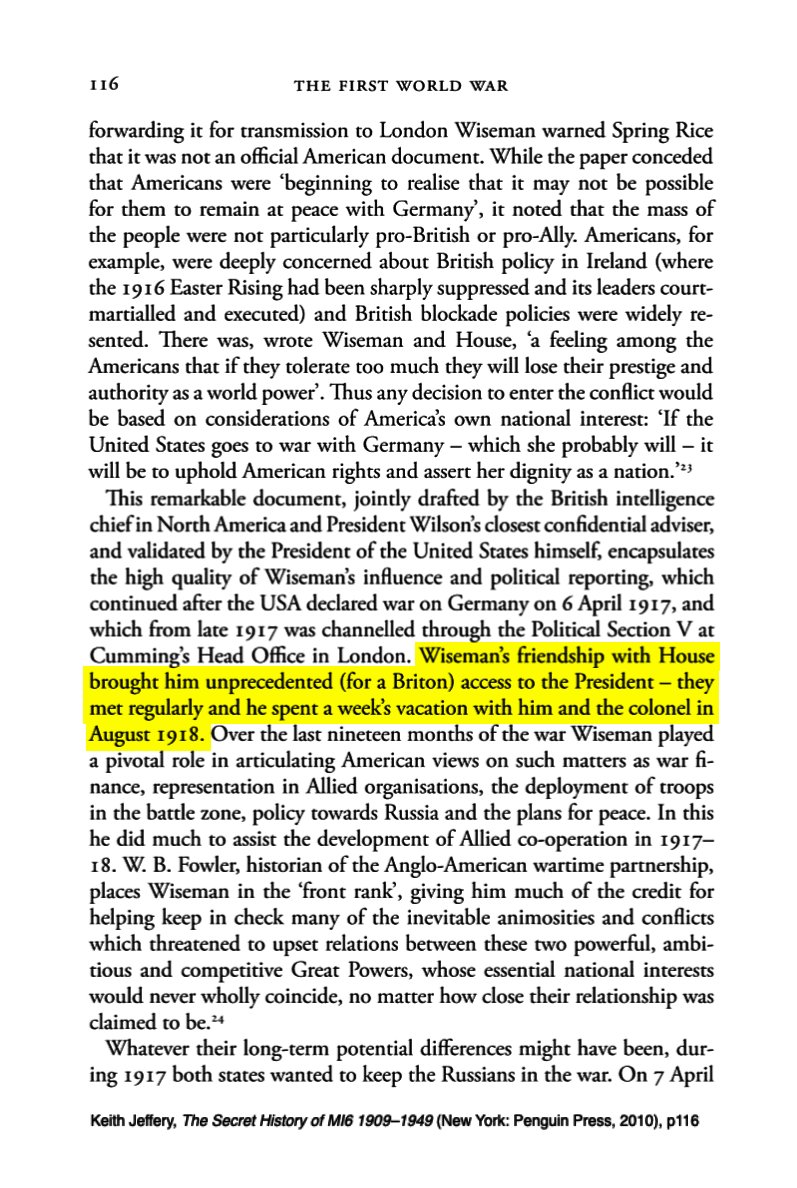
25 of 38
The idea for a "League of Nations" came from Sir Edward Grey, Britain's Foreign Secretary.
In a letter of Sept. 22, 1915, Grey asked Col.
House if the President could be persuaded to
propose a League of Nations, as the idea would
be better received coming from the US.




The idea for a "League of Nations" came from Sir Edward Grey, Britain's Foreign Secretary.
In a letter of Sept. 22, 1915, Grey asked Col.
House if the President could be persuaded to
propose a League of Nations, as the idea would
be better received coming from the US.
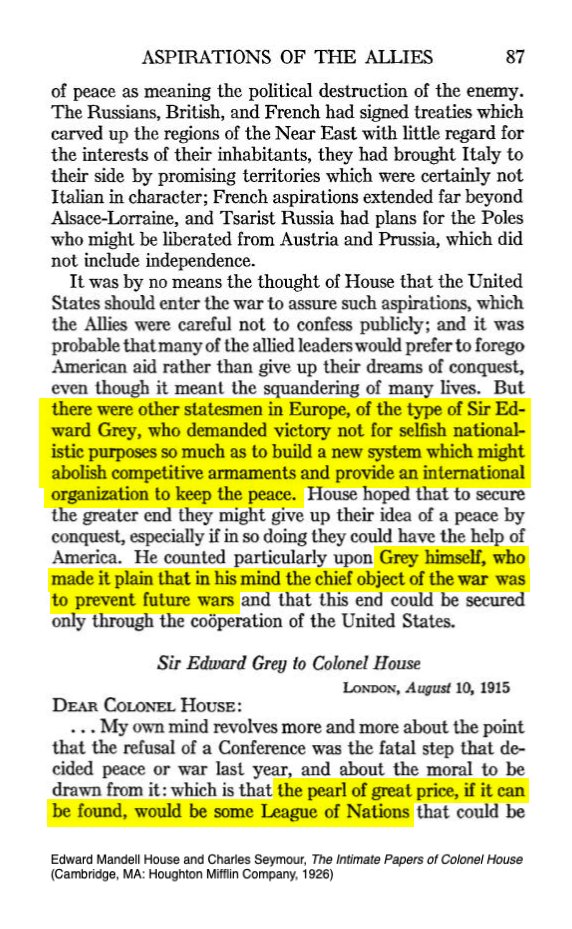

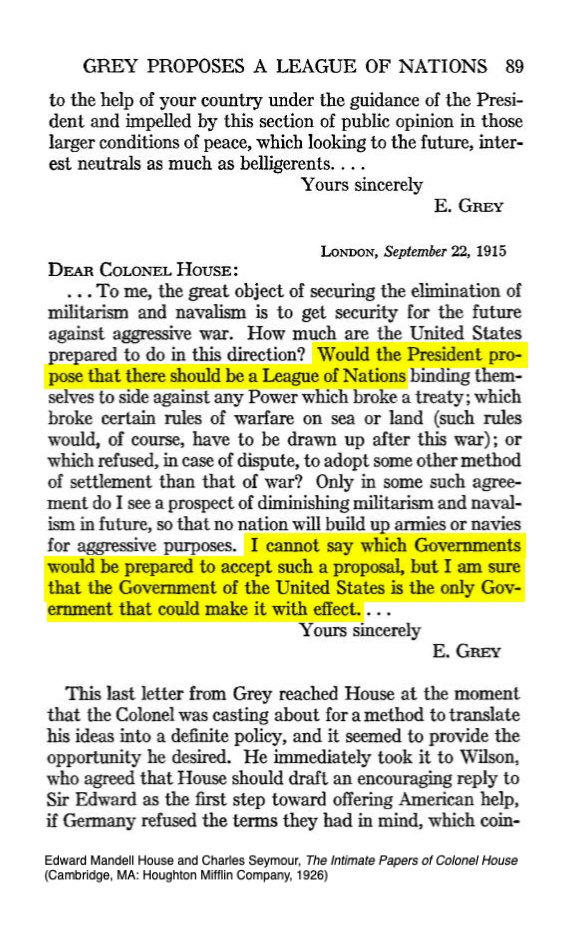
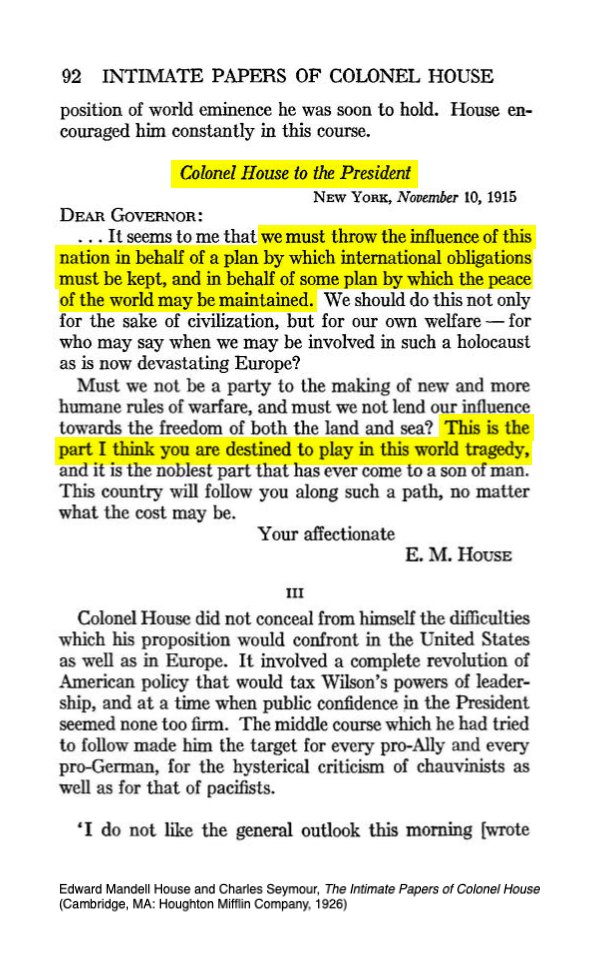
26 of 38
When Wilson attended the Paris Peace Conference in 1919, Wiseman and House were close at hand, guiding his every move, along with a bevy of other British and US officials, all committed to the globalist agenda, and many tied directly to the Round Table.


When Wilson attended the Paris Peace Conference in 1919, Wiseman and House were close at hand, guiding his every move, along with a bevy of other British and US officials, all committed to the globalist agenda, and many tied directly to the Round Table.
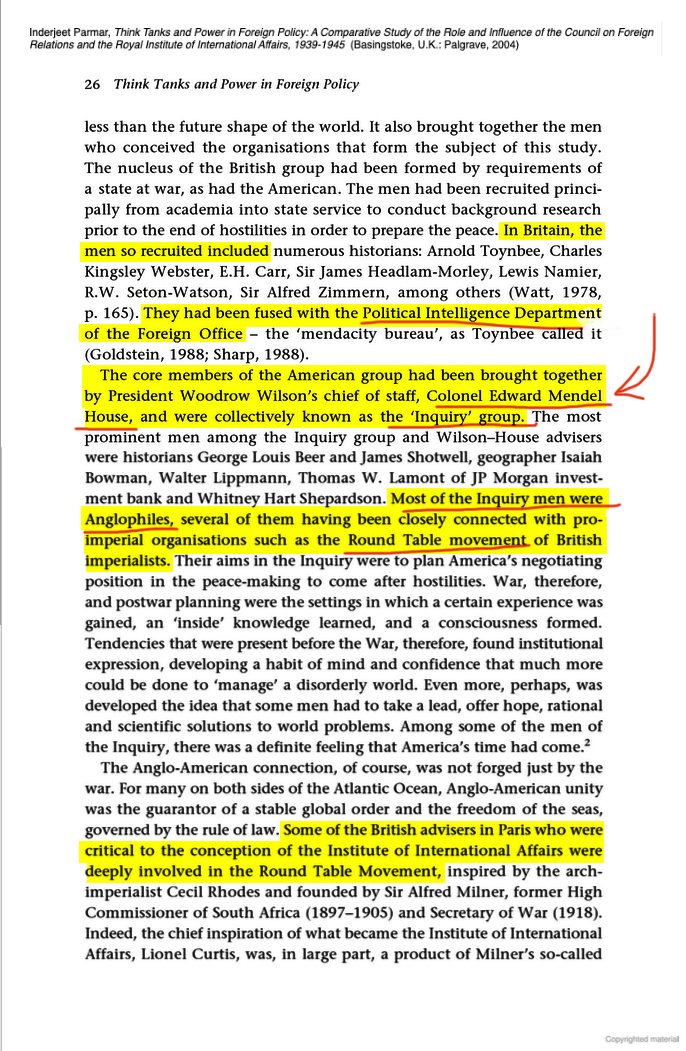

27 of 38
Former SIS officer John Bruce Lockhart later called Wiseman "the most successful 'agent of infuence' the British ever had."
British historian A.J.P. Taylor wrote that "He [Wiseman] and House made the 'special relationship' a reality."



Former SIS officer John Bruce Lockhart later called Wiseman "the most successful 'agent of infuence' the British ever had."
British historian A.J.P. Taylor wrote that "He [Wiseman] and House made the 'special relationship' a reality."
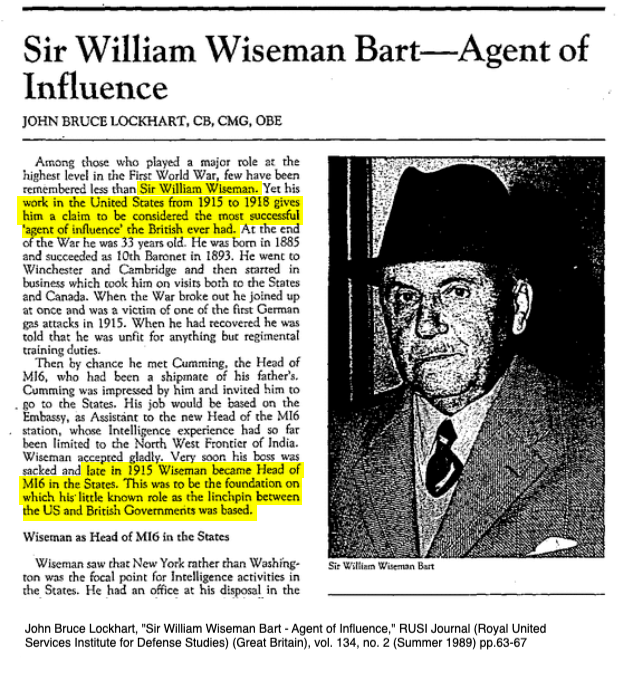
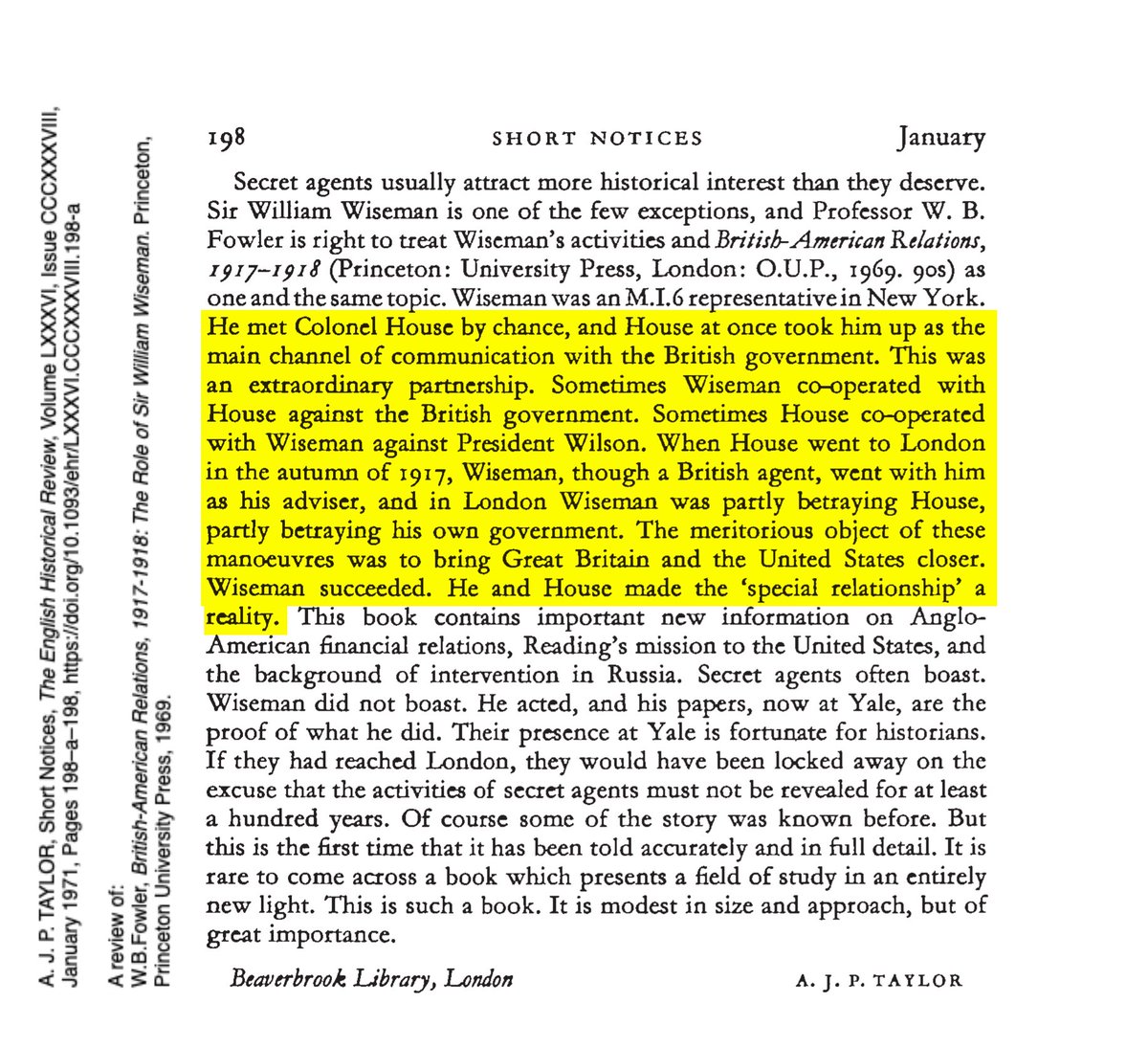
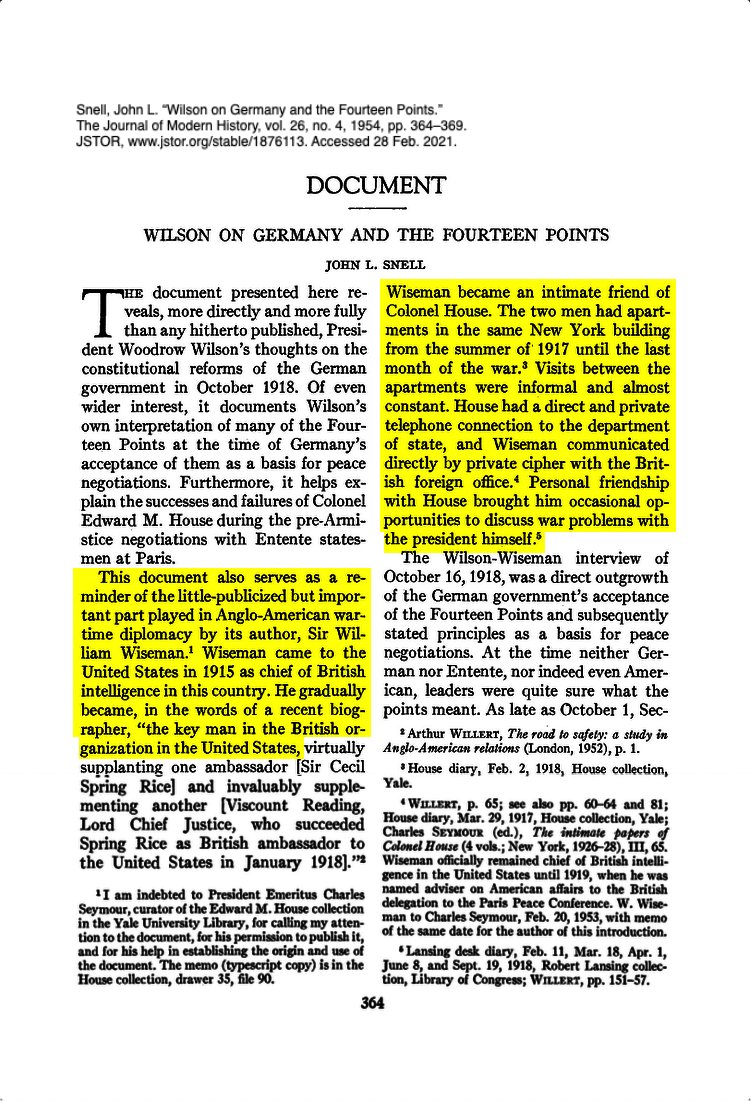
28 of 38
Many historians hold that the US-UK "special relationship" began only after World War II, with the creation of NATO and the UN.
However, Taylor correctly notes that the seeds of the "special relationship" were planted earlier, at the Paris Peace Conference of 1919.
Many historians hold that the US-UK "special relationship" began only after World War II, with the creation of NATO and the UN.
However, Taylor correctly notes that the seeds of the "special relationship" were planted earlier, at the Paris Peace Conference of 1919.
29 of 38
In Paris, US and UK officials secretly agreed to coordinate policy, so that both countries would act as one.
Two think tanks were created to facilitate this, Chatham House (UK) and the Council on Foreign Relations (US).
SEE THREAD BELOW.
In Paris, US and UK officials secretly agreed to coordinate policy, so that both countries would act as one.
Two think tanks were created to facilitate this, Chatham House (UK) and the Council on Foreign Relations (US).
SEE THREAD BELOW.
https://twitter.com/RealRichardPoe/status/1350135921941864457
30 of 38
To the great distress of British globalists, the US Senate refused to join the League of Nations.
It took another World War — and the persuasive talents of Winston Churchill — to finally draw the US into global government, via NATO and the UN.
To the great distress of British globalists, the US Senate refused to join the League of Nations.
It took another World War — and the persuasive talents of Winston Churchill — to finally draw the US into global government, via NATO and the UN.
31 of 38
Churchill's vision of global government was oddly similar to that of Cecil Rhodes and the Round Table.
Churchill called for a world organization, backed by a "special relationship" between English-speaking countries.
Churchill's vision of global government was oddly similar to that of Cecil Rhodes and the Round Table.
Churchill called for a world organization, backed by a "special relationship" between English-speaking countries.
32 of 38
On Feb. 16, 1944, Churchill warned that, "unless Britain and the United States are joined in a Special Relationship... within the ambit of a world organisation — another destructive war will come to pass."
Accordingly, the UN was founded on October 24, 1945.
On Feb. 16, 1944, Churchill warned that, "unless Britain and the United States are joined in a Special Relationship... within the ambit of a world organisation — another destructive war will come to pass."
Accordingly, the UN was founded on October 24, 1945.
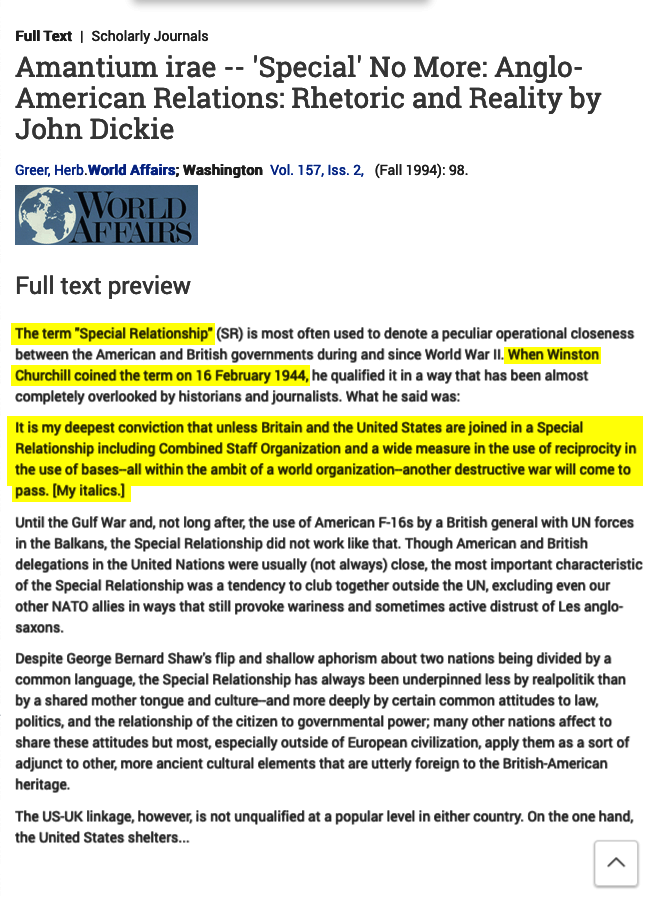
33 of 38
However, the UN was not enough.
Cecil Rhodes and the Round Table had always maintained that the true power behind any global government must be a union of English-speaking peoples.
Churchill repeated this plan in his "Iron Curtain" speech of March 5, 1946.
However, the UN was not enough.
Cecil Rhodes and the Round Table had always maintained that the true power behind any global government must be a union of English-speaking peoples.
Churchill repeated this plan in his "Iron Curtain" speech of March 5, 1946.
34 of 38
Churchill warned that the UN had no "international armed force" or atomic bombs.
The US must therefore join with Britain and other English-speaking countries in a military alliance, Churchill argued.
No other force could stop the Soviets.
winstonchurchill.org/resources/spee…

Churchill warned that the UN had no "international armed force" or atomic bombs.
The US must therefore join with Britain and other English-speaking countries in a military alliance, Churchill argued.
No other force could stop the Soviets.
winstonchurchill.org/resources/spee…
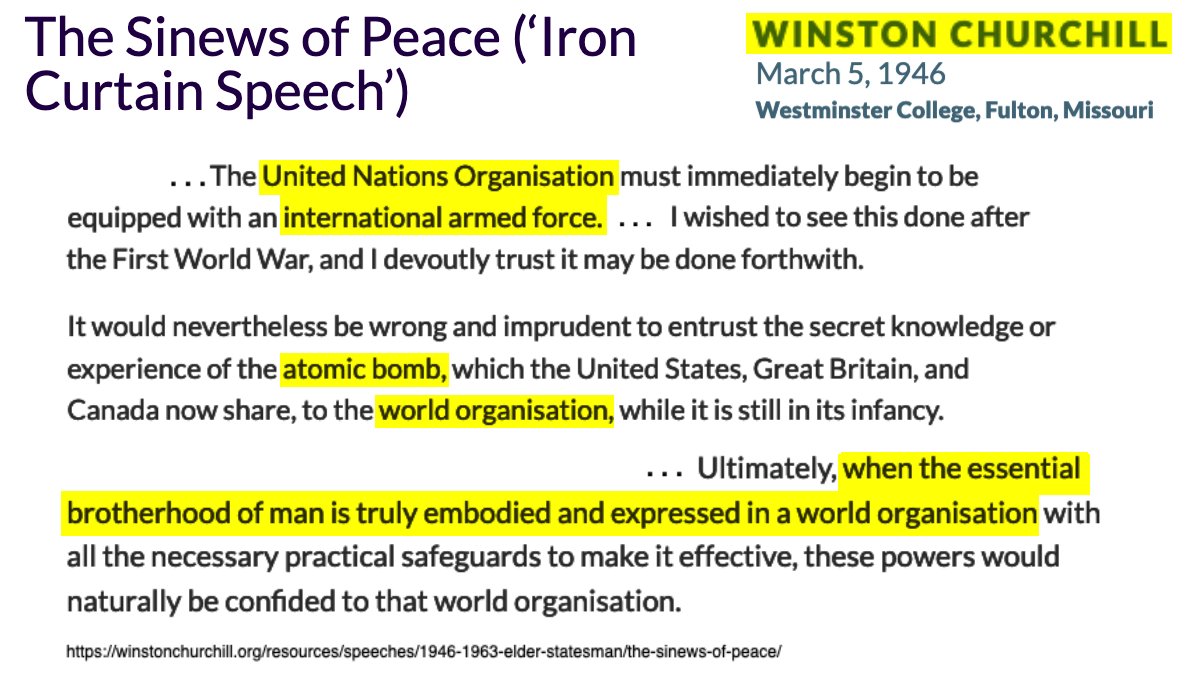
35 of 38
Churchill stated that "world organisation" was useless without "the fraternal association of the English-speaking peoples. This means a special relationship between the British Commonwealth and Empire and the United States."
winstonchurchill.org/resources/spee…

Churchill stated that "world organisation" was useless without "the fraternal association of the English-speaking peoples. This means a special relationship between the British Commonwealth and Empire and the United States."
winstonchurchill.org/resources/spee…
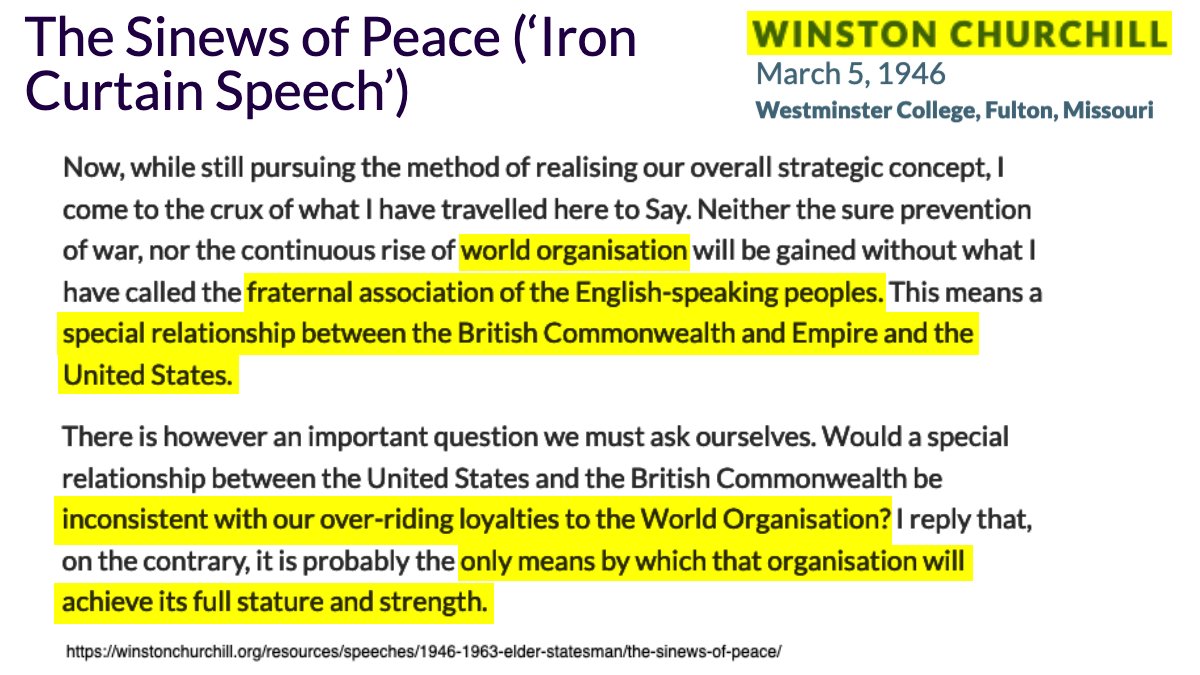
36 of 38
Churchill's words led to the "Five Eyes" agreement and the 1949 NATO Treaty, bringing us, step by step, ever closer to the global superstate Orwell called Oceania.
en.wikipedia.org/wiki/UKUSA_Agr…
nsa.gov/news-features/…
ukdefencejournal.org.uk/the-five-eyes-…
Churchill's words led to the "Five Eyes" agreement and the 1949 NATO Treaty, bringing us, step by step, ever closer to the global superstate Orwell called Oceania.
en.wikipedia.org/wiki/UKUSA_Agr…
nsa.gov/news-features/…
ukdefencejournal.org.uk/the-five-eyes-…
37 of 38
A self-described "Tory anarchist," Orwell hated Soviet Communism.
He could have written 1984 as a sort of British RED DAWN, with England groaning under Soviet occupation.
But that was not Orwell's message.
en.unesco.org/courier/enero-…
A self-described "Tory anarchist," Orwell hated Soviet Communism.
He could have written 1984 as a sort of British RED DAWN, with England groaning under Soviet occupation.
But that was not Orwell's message.
en.unesco.org/courier/enero-…
38 of 38
Orwell warned of a danger closer to home.
He warned of British globalists and their plan for a union of English-speaking countries driven by INGSOC ideology.
In many respects, the world we inhabit today is the world Orwell foresaw.
Orwell warned of a danger closer to home.
He warned of British globalists and their plan for a union of English-speaking countries driven by INGSOC ideology.
In many respects, the world we inhabit today is the world Orwell foresaw.
If you liked this thread, check out my new book, HOW THE BRITISH INVENTED COMMUNISM (AND BLAMED IT ON THE JEWS).
amazon.com/British-Invent…
amazon.com/British-Invent…
• • •
Missing some Tweet in this thread? You can try to
force a refresh















